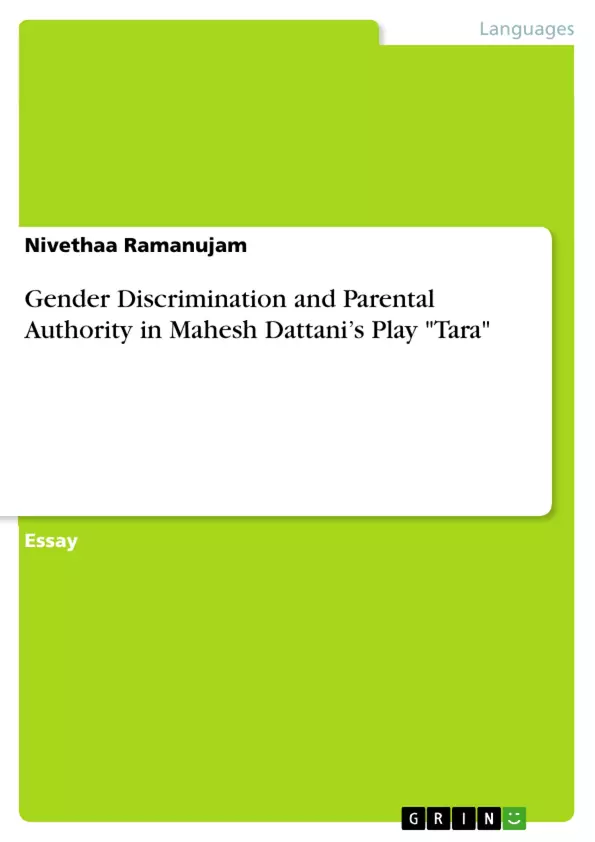Mahesh Dattani is a contemporary Indian playwright and his play "Tara" revolves around the separation of conjoined twins. Gender discrimination is the reason for the separation and the exercise of the parental authority is also observed in the course of the play.
The research focuses on how parental authority and gender discrimination lead to the death of the daughter Tara and deterioration of Patel’s family. The gender discrimination and parental authority account for the death of the innocent girl, Tara. The paper also looks into the aspect of society playing an invisible role in the separation of the twins.
Table of Contents
- Parental Authority and Gender Discrimination in Mahesh Dattani's Play Tara
- The Impact of Parental Authority on Tara
- Gender Discrimination and its Role in the Family
- Society's Invisible Role in Gender Conflicts
- Tara's Sacrifice and the Male Child Preference
- The Implications of the Separation Operation
- The Role of the Grandfather and His Influence
- The Doctor's Involvement and the Business of Separation
- The Children's Obliviousness to Gender Discrimination
- The Irony of Tara's Sacrifice
Objectives and Key Themes
This research paper examines the interplay of parental authority and gender discrimination in Mahesh Dattani's play "Tara," focusing on how these forces contribute to the tragedy of the conjoined twins, Tara and Chandan. The paper explores the dynamics within the Patel family, specifically the parents' decision to separate the twins, its impact on their lives, and the societal influences that shape their choices.
- Parental Authority and its Abuse
- Gender Discrimination and its Consequences
- Societal Influences on Family Dynamics
- The Impact of Gender Roles on Individual Lives
- The Importance of Recognizing and Addressing Social Evils
Chapter Summaries
The first chapter delves into the concept of parental authority, specifically its misuse in the context of the play. It analyzes the parents' decision to separate the twins, highlighting the detrimental effects of their biased preference for their son, Chandan. The chapter explores the psychological and emotional toll this decision takes on Tara, leading to her eventual demise.
The second chapter examines the prevalence of gender discrimination within the Patel family and its impact on the children. It highlights the societal influences that contribute to the parents' preference for their son, demonstrating how societal expectations shape their choices and actions.
The third chapter explores the role of society as an invisible influence on the family's dynamics. It analyzes the grandfather's strong gendered notions and how his influence, coupled with societal expectations, contributes to the parents' decision to separate the twins.
The fourth chapter examines the doctor's role in the separation operation, highlighting his willingness to prioritize his personal gain over the wellbeing of the children. This chapter demonstrates how individual interests can supersede ethical considerations, ultimately leading to tragic consequences for Tara.
The fifth chapter focuses on the children's naive understanding of their parents' choices and actions. It shows how Chandan's unwavering love for Tara and Patel's inability to acknowledge his daughter's feelings contribute to the family's disintegration.
The final chapter examines the tragic irony of Tara's sacrifice and her lack of recognition. It highlights the devaluation of Tara's life as a result of rigid gender roles and societal expectations, ultimately emphasizing the detrimental impact of these forces on individual lives.
Keywords
The research paper focuses on the key themes of parental authority, gender discrimination, societal influence, family dynamics, and the consequences of biased decisions. It explores the complex interplay between these factors, highlighting how they contribute to the tragedy of the play, "Tara."
- Arbeit zitieren
- Nivethaa Ramanujam (Autor:in), 2016, Gender Discrimination and Parental Authority in Mahesh Dattani’s Play "Tara", München, GRIN Verlag, https://www.grin.com/document/344796




